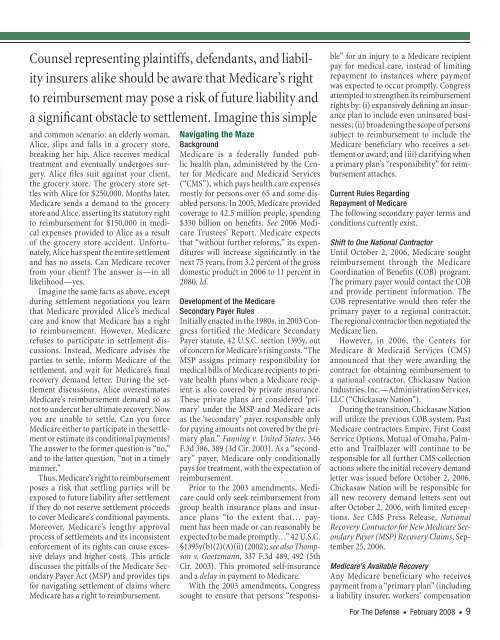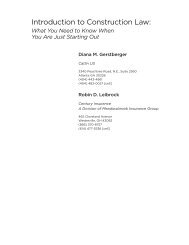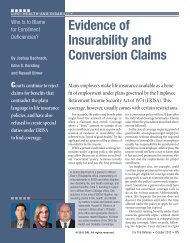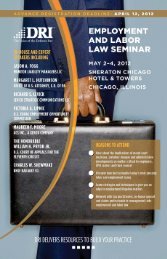Medicare Reimbursement Problems - DRI
Medicare Reimbursement Problems - DRI
Medicare Reimbursement Problems - DRI
You also want an ePaper? Increase the reach of your titles
YUMPU automatically turns print PDFs into web optimized ePapers that Google loves.
Counsel representing plaintiffs, defendants, and liability<br />
insurers alike should be aware that <strong>Medicare</strong>’s right<br />
to reimbursement may pose a risk of future liability and<br />
a significant obstacle to settlement. Imagine this simple<br />
and common scenario: an elderly woman,<br />
Alice, slips and falls in a grocery store,<br />
breaking her hip. Alice receives medical<br />
treatment and eventually undergoes surgery.<br />
Alice files suit against your client,<br />
the grocery store. The grocery store settles<br />
with Alice for $250,000. Months later,<br />
<strong>Medicare</strong> sends a demand to the grocery<br />
store and Alice, asserting its statutory right<br />
to reimbursement for $150,000 in medical<br />
expenses provided to Alice as a result<br />
of the grocery store accident. Unfortunately,<br />
Alice has spent the entire settlement<br />
and has no assets. Can <strong>Medicare</strong> recover<br />
from your client? The answer is—in all<br />
likelihood—yes.<br />
Imagine the same facts as above, except<br />
during settlement negotiations you learn<br />
that <strong>Medicare</strong> provided Alice’s medical<br />
care and know that <strong>Medicare</strong> has a right<br />
to reimbursement. However, <strong>Medicare</strong><br />
refuses to participate in settlement discussions.<br />
Instead, <strong>Medicare</strong> advises the<br />
parties to settle, inform <strong>Medicare</strong> of the<br />
settlement, and wait for <strong>Medicare</strong>’s final<br />
recovery demand letter. During the settlement<br />
discussions, Alice overestimates<br />
<strong>Medicare</strong>’s reimbursement demand so as<br />
not to undercut her ultimate recovery. Now<br />
you are unable to settle. Can you force<br />
<strong>Medicare</strong> either to participate in the settlement<br />
or estimate its conditional payments?<br />
The answer to the former question is “no,”<br />
and to the latter question, “not in a timely<br />
manner.”<br />
Thus, <strong>Medicare</strong>’s right to reimbursement<br />
poses a risk that settling parties will be<br />
exposed to future liability after settlement<br />
if they do not reserve settlement proceeds<br />
to cover <strong>Medicare</strong>’s conditional payments.<br />
Moreover, <strong>Medicare</strong>’s lengthy approval<br />
process of settlements and its inconsistent<br />
enforcement of its rights can cause excessive<br />
delays and higher costs. This article<br />
discusses the pitfalls of the <strong>Medicare</strong> Secondary<br />
Payer Act (MSP) and provides tips<br />
for navigating settlement of claims where<br />
<strong>Medicare</strong> has a right to reimbursement.<br />
Navigating the Maze<br />
Background<br />
<strong>Medicare</strong> is a federally funded public<br />
health plan, administered by the Center<br />
for <strong>Medicare</strong> and Medicaid Services<br />
(“CMS”), which pays health care expenses<br />
mostly for persons over 65 and some disabled<br />
persons. In 2005, <strong>Medicare</strong> provided<br />
coverage to 42.5 million people, spending<br />
$330 billion on benefits. See 2006 <strong>Medicare</strong><br />
Trustees’ Report. <strong>Medicare</strong> expects<br />
that “without further reforms,” its expenditures<br />
will increase significantly in the<br />
next 75 years, from 3.2 percent of the gross<br />
domestic product in 2006 to 11 percent in<br />
2080. Id.<br />
Development of the <strong>Medicare</strong><br />
Secondary Payer Rules<br />
Initially enacted in the 1980s, in 2003 Congress<br />
fortified the <strong>Medicare</strong> Secondary<br />
Payer statute, 42 U.S.C. section 1395y, out<br />
of concern for <strong>Medicare</strong>’s rising costs. “The<br />
MSP assigns primary responsibility for<br />
medical bills of <strong>Medicare</strong> recipients to private<br />
health plans when a <strong>Medicare</strong> recipient<br />
is also covered by private insurance.<br />
These private plans are considered ‘primary’<br />
under the MSP and <strong>Medicare</strong> acts<br />
as the ‘secondary’ payer responsible only<br />
for paying amounts not covered by the primary<br />
plan.” Fanning v. United States, 346<br />
F.3d 386, 389 (3d Cir. 2003). As a “secondary”<br />
payer, <strong>Medicare</strong> only conditionally<br />
pays for treatment, with the expectation of<br />
reimbursement.<br />
Prior to the 2003 amendments, <strong>Medicare</strong><br />
could only seek reimbursement from<br />
group health insurance plans and insurance<br />
plans “to the extent that… payment<br />
has been made or can reasonably be<br />
expected to be made promptly…” 42 U.S.C.<br />
§1395y(b)(2)(A)(ii) (2002); see also Thompson<br />
v. Goetzmann, 337 F.3d 489, 492 (5th<br />
Cir. 2003). This promoted self-insurance<br />
and a delay in payment to <strong>Medicare</strong>.<br />
With the 2003 amendments, Congress<br />
sought to ensure that persons “responsi-<br />
ble” for an injury to a <strong>Medicare</strong> recipient<br />
pay for medical care, instead of limiting<br />
repayment to instances where payment<br />
was expected to occur promptly. Congress<br />
attempted to strengthen its reimbursement<br />
rights by: (i) expansively defining an insurance<br />
plan to include even uninsured businesses;<br />
(ii) broadening the scope of persons<br />
subject to reimbursement to include the<br />
<strong>Medicare</strong> beneficiary who receives a settlement<br />
or award; and (iii) clarifying when<br />
a primary plan’s “responsibility” for reimbursement<br />
attaches.<br />
Current Rules Regarding<br />
Repayment of <strong>Medicare</strong><br />
The following secondary payer terms and<br />
conditions currently exist.<br />
Shift to One National Contractor<br />
Until October 2, 2006, <strong>Medicare</strong> sought<br />
reimbursement through the <strong>Medicare</strong><br />
Coordination of Benefits (COB) program.<br />
The primary payer would contact the COB<br />
and provide pertinent information. The<br />
COB representative would then refer the<br />
primary payer to a regional contractor.<br />
The regional contractor then negotiated the<br />
<strong>Medicare</strong> lien.<br />
However, in 2006, the Centers for<br />
<strong>Medicare</strong> & Medicaid Services (CMS)<br />
announced that they were awarding the<br />
contract for obtaining reimbursement to<br />
a national contractor, Chickasaw Nation<br />
Industries, Inc.—Administration Services,<br />
LLC (“Chickasaw Nation”).<br />
During the transition, Chickasaw Nation<br />
will utilize the previous COB system. Past<br />
<strong>Medicare</strong> contractors Empire, First Coast<br />
Service Options, Mutual of Omaha, Palmetto<br />
and Trailblazer will continue to be<br />
responsible for all further CMS collection<br />
actions where the initial recovery demand<br />
letter was issued before October 2, 2006.<br />
Chickasaw Nation will be responsible for<br />
all new recovery demand letters sent out<br />
after October 2, 2006, with limited exceptions.<br />
See CMS Press Release, National<br />
Recovery Contractor for New <strong>Medicare</strong> Secondary<br />
Payer (MSP) Recovery Claims, September<br />
25, 2006.<br />
<strong>Medicare</strong>’s Available Recovery<br />
Any <strong>Medicare</strong> beneficiary who receives<br />
payment from a “primary plan” (including<br />
a liability insurer, workers’ compensation<br />
For The Defense n February 200 n








